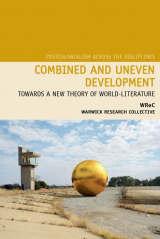Please join us in welcoming guest lecturer Professor Nick Lawrence from the University of Warwick Department of English and Comparative Literary Studies Department.
Thinking Modernity from the Perspective of the Capitalocene
This talk examines a cluster of related concepts – modernity, ‘enlightenment,’ the Anthropocene – in response to recent debates around how to theorize, and periodize, what might be called the natural history of capital. The year 2020 has already seen the intensification of a series of so-called natural disasters (firestorms in Australia, Siberia and the American West; flooding in Indonesia, China, Sudan and Bangladesh; locust swarms in East Africa and South Asia; and, not least, the global outbreak of the COVID-19 pandemic), disasters that continue to highlight the untenability of conventional divisions between human and natural history. At the same time, this year has witnessed a storm surge of social conflict in intimate relation with these seemingly natural phenomena, from refugee crises to hunger riots to ‘civil unrest’ over the systemic application of racialized state violence. Fossil-fueled sponsorship of climate skepticism notwithstanding, the case for reading social and natural environments as part of a singular, if profoundly uneven and striated history stretching back at least to the ‘age of enlightenment’ – not coincidentally, the age of plantation slavery and carbon-driven industrialism – has never been more compelling.
In this context, it may be worth revisiting some of the foundational texts of critical theory – in particular, Walter Benjamin’s ‘On the Concept of History’ (1940) and Theodor W. Adorno and Max Horkheimer’s Dialectic of Enlightenment (1944, 1947) – in order to excavate the place of extra-human nature within their understandings of enlightenment and capitalist modernity. How do these works speak to more recent attempts at grasping the logic of climate breakdown from the perspective of global environmental justice? How might we bring the range of concerns highlighted in 1940s critical theory – from the dynamics of class struggle to the domination of nature to the industrial production of culture – into common focus? And what do they suggest about ways of theorizing environment and culture together today?
Dr. Warwick is a member of the Warwick Research Collective (WReC) at the University of Warwick and co-author of Combined and Uneven Development Towards a New Theory of World-Literature
This lecture is open to all ICSLAC faculty and all students in the Cultural Mediations PhD program. Please email Dawn Schmidt to obtain the link for this event.
